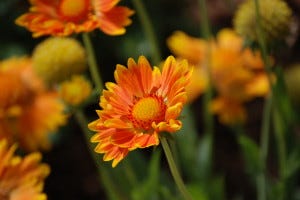Spiritual gardening for the dissociated soul
Trigger warning: This post is about recovery from sexual assault. Sometimes a book can speak to you like a good friend, heart to heart, soul to soul, sharing secrets you never imagined anyone else had thought or experienced. The author wrote words many years ago but may have imagined that there would be a reader in need of the wisdom learned from hard experience. Dissociation is a way for the mind to cope with pain or fear or with other overwhelming emotions or events. Children who experience trauma may have coped by allowing their minds to dissociate or separate from feeling the physical sensations or from being mentally present during the traumatic event. Dissociation is a natural reaction to intense experiences but it can become a lesson that is too well learned, a strategy for coping that becomes too much of a habit for the rest of life. Recovering a sense of connection to self and with the world can be difficult for the survivor of childhood trauma. Dissociation became a habit for Karla McLaren, the author of Rebuilding the Garden: Healing the Spiritual Wounds of Childhood Sexual Assault (1997). [1] She experienced ongoing sexual assault beginning at age three. The culprit was caught but the dissociation remained for the author as a feeling of being incomplete and disconnected during her youth and young adult years. The book grew from her personal discovery and exploration of an inner sanctuary that can exist within our minds whenever we care to imagine it and visit. She describes the inner sanctuary in terms of a garden with herself as the gardener. Sexual assault occurring during childhood violates boundaries and can take away an inner sense of self.
"Since the lasting wound of sexual assault occurs in a quiet spiritual center that no one ever mentions, it is very hard for assault survivors to understand why they don't get better." [page 5, 1]
The assault destroys the inner sanctuary but the survivor is not the ruined garden but is instead the gardener who can rebuild boundaries that protect and heal. Assault during childhood teaches the survivor that they have no boundaries and are open to invasion. Later in life the adult survivor may have problems relating well to others. Some survivors may be overly controlling of every aspect in their lives while others may seek stimulation and act out of control. Normal sexual relations may be difficult for some survivors.
"Many assault survivors become excellent puppeteers when sex is "happening" to them; they pull the right strings and make the right noises, but they are not present at all. They are off in a dream world, or up on the ceiling." [page 57, 1]
Meditative relaxation is somewhat similar to the strategies described but the visualization exercises in the book delve more into the energy of the chakras and auras. The author describes the dissociated self in terms of being split. The visualization exercises are varied but aim to help the reader reconnect with their fragmented self and with the world around them.
"Not going anywhere in life, not living in peace, not truly knowing how to behave around people, relying on relationships for inner peace: these are just some of the characteristics of people who come to me for classes, and when I see them, they are often at the end of their ropes. People usually don't come to psychic healers first." [page 36, 1]
Seeking guidance from someone who self designates as a psychic healer may not be a first choice for most people but dissociation is the mind or psyche separating itself from the body's present. The visualization strategies the author shares are designed to help restore a sense of an inner core that is always safe and to help reconnect to the world. A lifelong habit of dissociation isn't treatable with a pill. Anti-anxiety medications may be provided to help cope with anxiety if that is also present. Cognitive therapy, retraining the brain, is the most effective strategy used currently for treating people with dissociative disorders. But for that you would need an appointment with a therapist who believes in dissociative disorders. So in the meantime, there's always Amazon. Finding an author who believes in the problem and believes that recovery is possible is at least a place to start even if it's not a first choice. [1]

Gloriosa greets
the day in the cheerful way,
that all daisies share. /Disclaimer: This information is provided for educational purposes within the guidelines of fair use. While I am a Registered Dietitian this information is not intended to provide individual health guidance. Please see a health professional for individual health care purposes./



